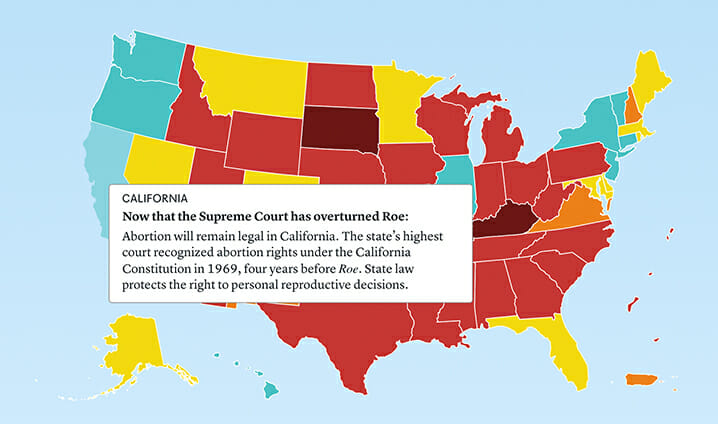From the very beginning, this space has been committed to sharing a wide variety of perspectives on health and wellness, allowing our readers to educate themselves and make informed decisions that suit them and their families best. Wellness, after all, is not a one-size-fits-all journey.
Throughout the last few years, we have remained remarkably apolitical around the swell of heated issues facing our nation and have instead continued to pour out as much mental, emotional and mind-body health support as we can. As you might imagine, our team has a variety of passionate opinions on everything, but believe that we can serve you best by serving up the wellness content you come to us for.
That said, with the historic overturning of Roe V. Wade and it’s profound effect on maternal healthcare — despite it’s deeply political nature — we wanted to support readers in understanding how this will effect them personally, state by state. This comprehensive resource from the Center For Reproductive Rights, provides detailed information on each state’s status post-Roe, assigning every region one of five designations and providing detailed information about the pertinent laws in your area.
Understand the ramifications of this historic change for women’s reproductive rights in your state by clicking on the state that interests you and exploring helpful summaries of the legislation in place or in process in your area. Expand the sidebar per state for a thorough exploration. The CFRR claims to be keeping this map updated in real time “as needed’.
Because we are an LA-based publisher with so many Californian readers, here are a few things you should know about what the overturning of Roe V. Wade means in this state:
+ As California legalized some abortions before Roe was ever decided, the state does not have any pre-Roe bans. California’s highest court recognized abortion rights under the state’s Constitution in 1969, four years before Roe.
+ While abortion in California is legal, there are currently two key restrictions:
Viability | California law generally prohibits abortion at viability. Viability is defined as the point that “in the judgement of the attending physician on the particular facts of the case before them, there is a reasonable likelihood of the fetuses’ sustained survival outside the womb, with or without artificial support.”
Parental Consent for Minors | California requires parent or legal guardian consent to a minor’s abortion.
On June 24, California’s Governor Gavin Newsom signed AB 1666 in response to Roe’s overturning. AB 1666 is intended to protect the state’s abortion providers and patients who come from other states that may face civil actions from those states.
Share the post “What the Overturning of Roe V. Wade Means In Your State Currently”












